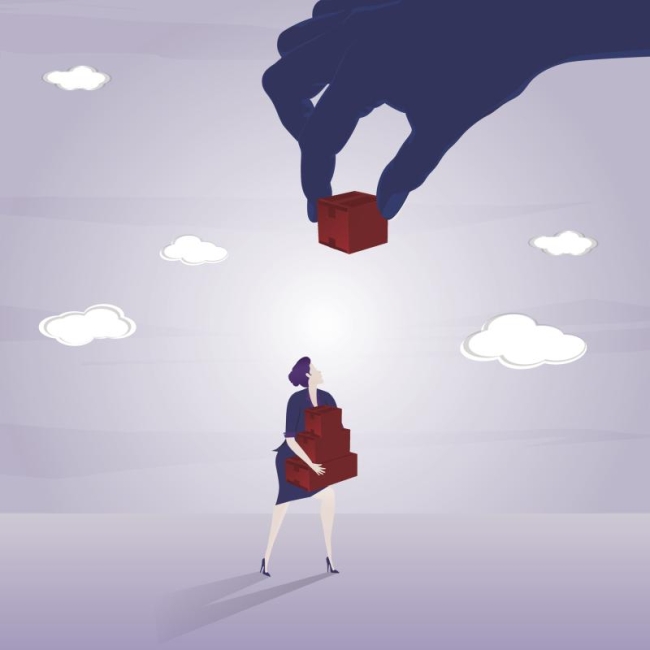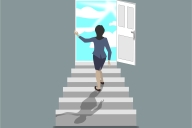You have /5 articles left.
Sign up for a free account or log in.

xubingruo/DigitalVision Vectors/Getty Images
I have been a highly productive scholar and committed campus citizen for nine years. I have poured myself into my university’s mission—into teaching, engagement, service and scholarship. I have told friends and family I have the best job in the world. I have worked to embody an ethos of care and inclusivity in hopes of building a thriving and just academe. My university and professional society have rewarded and recognized me.
But in the past three months, I have found myself questioning if I can continue being a tenured professor or whether the best thing to do is just resign. Like so many of my colleagues, I don’t want to give up what was a joyful profession and hate even more to abandon it, but something has to change.
When my child was diagnosed with a severe illness in December 2021, I was already languishing in a simmering stew of burnout and discouragement. Since then, the subsequent experience of attempting to balance their care needs with my job has ignited a full-blown professional crisis.
It was weirdly fortunate that we discovered our child’s illness at the beginning of winter break. In the early weeks of staying with them 24-7 to ensure their safety, I was already off from work and things were quiet, with most people out of the office. When it was clear our child would need continuing and dedicated parental care as the start of the term neared, a campus policy allowed me to modify my duties temporarily to fit my family-care needs. I gratefully stayed home and stumbled along, trying to manage the nonteaching part of my job remotely. But my child got sicker. Eventually I had to take two full weeks off to give them my undivided attention.
Those two full weeks were without meetings, email correspondence, writing or reading (although a few tasks sneaked in here and there). Two full weeks doesn’t sound like so much—many people take two-week vacations, or so I hear. But when I attempted to return to work after my child’s care regime changed, it became clear that two weeks might as well have been an entire semester. Although I was away from work with my supervisor’s blessing, the work did not go away. It just piled up. And it piled up on top of a system already teetering on the brink of collapse.
Each day back at work, my depression and anxiety have worsened as the deadlines, student requests and reminders fly at and by me like road signs on a high-speed interstate trip. As I began to struggle with even basic tasks like getting out of bed in the morning, I came to see that the only way for me to survive in this job is to ask the unthinkable: to declare academic Chapter 11. I must go to my colleagues and ask for a release from overdue tasks, to find another reviewer, to find another person to judge the poster session, to do that planned manuscript without me or not at all. Even more unthinkable: I must return grant money, because the planned work just can’t be done.
I simply have no way to catch up at this point. Extensions don’t help. Not only do I lack the capacity to think with the clarity and dexterity necessary to manage a complex workload and the emotional tenacity to work endless hours, even if I did, I would never catch up. The gap between the length of my to-do list and my own resources—time, energy and willpower—has stretched into an impassable chasm.
While this workload debt crisis is partly explained by personal choices and the extreme circumstance of my child’s illness, it has other causes, too, causes that are systemic to academe and public institutions like mine. I want to share my perspective on these other causes for my own catharsis and also in the hope of helping others by being open about where they are as we begin to see the end of COVID.
My burnout and despair have developed over the course of the pandemic. Because of the COVID crisis, my flourishing career trajectory careened off course, with international fieldwork and new projects deferred indefinitely in the blink of an eye. Worse, all of the basic activities that made my work flow—fieldwork with diverse people, leading a vibrant classroom, talking and learning in a group—were gone in an instant. I tried everything I could to muster a resilient response. I took to Zoom. I redesigned classes. I actively participated in campus service and governance in the interest of students and colleagues. And I did it all while having school-aged children at home for long periods of time and trying (and failing miserably) to address their need for education and stimulation.
Beyond my own frustrations at feeling I was doing many things ineffectively, I watched the devastating impact of COVID on colleagues and their families and communities—and I was deeply troubled by their pain and suffering. This was after years of witnessing colleagues succumb to mental and physical health issues from overwork. I tried at every turn to raise concerns about faculty morale and, more specifically, to propose interventions to ensure COVID didn’t exacerbate inequality among faculty.
Unfortunately, my efforts to advocate for the vulnerable among my colleagues went pretty much nowhere at my institution. They encountered not so much callous disinterest, but more a kind of shut down born out of terror and panic. We were told not to make a fuss—to please just pivot, learn to do new things and carry on—and under no circumstances to do anything to upset tuition-paying parents or the state Legislature. We were all in this together.
As we carried on, we shouldered an endlessly burgeoning—and burdensome—workload. Our campus workforce was progressively depleted thanks to the combined effects of a hiring moratorium, compounded by attrition and a housing-affordability crisis. The gaps to fill, the leaks in the dike of having a functional campus, just got bigger and bigger, the workload heavier and heavier and heavier. The authentic thank-yous became few and far between. The opportunities to say “uncle,” to say, “I’m grieving what I’ve lost,” to say, “I don’t know if I can go on,” were nonexistent.
Buying In
At the same time, one of my children speaks regularly and seriously about not wanting to grow into adulthood because of their fear and anger and grief about a changed climate. Friends are overcome with solastalgia while whole towns burn up in wildfires, summer skies are filled with smoke and rivers dry up. More palpable trauma that seeps into my body and soul and squashes my hope and joy.
I keep wanting to stuff my fears and grief back inside and keep calm and carry on. It’s my instinct to just drink more coffee, cover up my exhaustion and get up at 4:30 a.m. to answer emails. I routinely skip family vacations to attend to overdue projects. This is what society expects parents in professional positions to do. This kind of “dedication” is rewarded, particularly in meritocratic cultures like academe.
And we buy in. Tenure-track faculty have become like lemmings walking off a cliff of overwork. Every year, the tenure portfolios get more and more padded and bloated, and the unspoken but always-legible list of what to do to “succeed” gets ever longer. The profound need for help running the university expands inexorably, as many states abandon any premise of investing in public infrastructure. And we do nothing to stop it all, in part because academe breeds FOMO better than any system I know of, in part because saying no could put our own careers at risk by branding us as selfish or not collegial, but also (and I believe this is a very real motivation) because the vast majority of us just don’t want to let our students and colleagues down. And so we just keeping marching, even if off the cliff.
But I can’t do it right now. I just can’t keep my grief and exhaustion down well enough to carry on.
This appeal to my colleagues for an academic Chapter 11 feels like a horrible, thankless decision. It makes more work for people who don’t have any spare capacity, many of them people whom I feel bound to as cherished colleagues, students and mentors. To them I ask:
Please allow me to recover my resilience so I can be the parent, scholar, teacher and leader—and human—I want to be. To do this, I need to heal and to do that I need space; I need debt relief, I need academic restructuration. I’ll carry on with the few projects I know I can manage and where my time will be best spent. Please know I would do the same for you. I’d like to hope that I won’t have to, though, because together we can change this crazy, broken system.
But before we envision a sustainable academy, we need to make space to grieve what’s been lost, the ambiguous and the concrete. I know I’m not at all unique. We need to start a conversation about what grief and recovery look like. It’s time.








